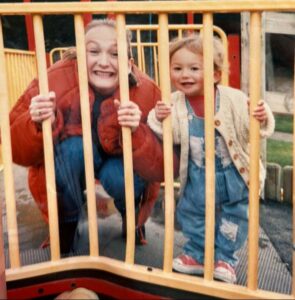A guest blog by Sarah Hussey.
The day that Holly got her ADHD diagnosis was bittersweet to say the least. She was 28 years old and we were in the Psychiatrist's office together after an intensive assessment process that went from her early years right up to the present day. We had arrived at the place together after Holly had admitted being really struggling (not for the first time) with life in general and had returned to significant self-harming. This diagnosis has changed our outlook on life but would have been far more useful 15 years ago. I doubt very much that she would have been diagnosed before her teenage years. As her mother I felt both relief that we had finally got there and guilt that it had taken so long. As an educator all I could think was ‘how the F**K did I not put two and two together and make four’. And therein lies the problem for women with late diagnosis ADHD; all the health and education professionals involved with you over the years (and sometimes your own family) put two and two together and make five, six or even seven – but never four!
When I began teaching in 2000, ADHD was something that only boys were diagnosed with, and often it was thought that chaotic/negative parenting played a central role (nonsense of course!) These boys were often impulsive, loud and caused daily disruption in your class, and this is still very much how it presents in boys today. Thank god we are better educated now but I wonder how many girls in my classes were struggling with ADHD, but because it presents so differently in females are now only getting the support they need?
In Holly’s early life there were factors that would not have led you to an ADHD diagnosis initially; she had a traumatic birth which led to her being in NICU and the first nine years of her life was spent in a home where domestic violence and alcohol and drug abuse was the norm – something we have all taken a long time to process and accept.
As a baby she never slept for longer than two hours, night or day! I did not know whether I was coming or going for the first two years of her life. She slept with me every night and only managed one night in her cot, and she screamed herself to sleep whilst I cried (the health visitor said I had to be tough!) Incidentally, when her sister was born three years later, she slept through the night at ten days old. I had to keep checking that she was breathing!

Holly was a curious child, her speech was great and she read at an early age – her love of books came from her maternal Grandma. She loved to learn and could retain so many facts and figures about things that she was interested in – if she wasn’t interested, forget it! She liked to please at school and was compliant and followed the rules. At home, she was a live wire, she wanted to do everything. At one stage in her school life we were running her to events every night of the week and at weekends. She played football, cricket, netball and she was part of an athletics club and ran long distances competitively. She rode horses, and surfed and swam – in fact she swam the Solent! She still runs most days and has competed in marathons and triathlons. Once she began High School at 13, she joined the gym and went twice a day most days. She was also very academic and took her studies very seriously. It was also obvious that she struggled with relationships with others and her own view of herself. We really struggled to understand how her mind worked – not long ago she told me that her head was ‘so loud.’
During her teenage years Holly struggled with her mental health – she lost a lot of weight and was not eating anywhere near enough to fuel the daily exercise she was undertaking. She was diagnosed with Anorexia and referred to CAMHS. Over the years there have been many suggestions and diagnoses from various professionals – Anxiety, Depression, Bi-Polar Disorder and Anorexia have all been attached to Holly and all with different treatments including medication. None of these ever seemed to make things any more understandable or manageable for her or the rest of the family. Then it was time for university, and this is when she really began to unravel. Managing life was too difficult for her and she was completely overwhelmed all the time and like so many young women in her position she self-medicated with whatever helped her at the time. Believe it or not, despite how hard it was and still is, she has a nursing degree and is now training to be a doctor. Her resilience astounds me.
Holly is one of many young women who have been wrongly diagnosed for years. It is a sound argument that it is because we knew less about ADHD in women 10 or 15 years ago – but we know now and have to do better! For a start, waiting lists are so long on the NHS you may as well give up before you even start – we were lucky enough to have family support us to go through the assessment privately. However, this in itself comes with the fact that some people think that if you pay for a diagnosis then of course you will get it! (I don’t think any of us, including Holly, wanted her to have ADHD). Educators need training to recognise the signs of ADHD in girls so they won’t have to struggle for so long. Research now shows that if young people are safely medicated earlier on in life, they will be less likely to use drugs/alcohol/sex/crime to self-medicate – surely this is what we want for our young people?
Holly does take medication to help the symptoms of her ADHD – it took a while to get the dosage right and for her to accept the side-effects, which are not pleasant. She can choose when she can have a break from them and knows that they do not mix with alcohol – she hasn’t drunk for months. We have both been on a journey and have read lots of books together and researched how ADHD is different between males and females. As a mum, I hope that I understand her better and try very hard not to let things that would have annoyed me before worry me – like the inability to see any of the mess she creates around herself or the difficulties she has when plans change. I sincerely hope that she understands herself better and accepts that there are some things in life that she will always find hard. The one thing that the Psychiatrist said that has stuck with me, is that he was utterly amazed that Holly has succeeded with so many things in her life considering the significant impact ADHD has on people. (I do intend to follow up this blog with others about ADHD and how it presents in females, but if I continue writing now it will become the first chapter of a book and not a blog!)
I have written this with Holly’s blessing and I am hoping that she is also going to write a blog telling us all what it is like for her.
I am incredibly proud of how she has survived this journey and is now beginning to thrive – it has been a hard road for her and everyone that loves her and I am grateful to you all for showing her patience and understanding.
Incidentally, ADHD is thought to be genetic and the more I have learned about it and myself the more I believe that I too have ADHD. I have been referred for an assessment by my wonderful therapist but on the NHS – I am in no hurry as I have managed it for this long. People often comment on how alike Holly and I are in many ways, so ADHD will become something else that we share.
28th August 2023
A guest blog written by Julie Cassiano. Follow Julie on X (Twitter) @julie_cass1.
Firstly, a huge congratulations on securing your first headship. I could not be happier for you. You must be feeling excited, nervous, eager, apprehensive and every other emotion there is. Do not worry, this is normal. I hope this blog supports your transition into headship.
Confident not arrogant
You may start to self-doubt your capability, allowing your mind to play tricks on you… please stop! Remember it is not your job to assess YOU, thankfully those who appointed you and submitted a reference selected YOU, so, newsflash, you are the right candidate! It is important from day one your behaviours demonstrate to others (all stakeholders) you are confident to LEAD but without arrogance.
Why is this important?
Believe it or not your stakeholders want you to be successful! Any employee who has worked for a leader who struggles to lead will know this makes the job far less doable and enjoyable. They will want you to show up as a leader who can continue their school’s journey from whatever their starting point. So, what does confident and able to lead mean? It certainly does not mean you turn into Sharpea from High School Musical (just watched with my daughter) – bossing everyone around and throwing tantrums when deadlines are not met – oh no, no! It’s about:
- Calm and patient – take time to reflect before acting
- Active listening
- Accepting feedback
- Bringing people together to evaluate and problem solve
- Creating independent leaders
Confidence is having the strength and wisdom to know it isn’t about you, it’s about empowering those you lead.
Coaching
I was fortunate enough to have two coaches during my first term, yes, two! I had an informal coach, someone who knew me well and had seen my career develop over the years. The second was formal with planned slots & agenda. Both offered different expertise. I truly believe I needed both for differing leadership challenges.
Self-care
Know the job is never complete. You have made it to headship so time management should not be an issue, but prioritise time for you and your loved ones. This is as important as blocking out time for meetings. I would like to thank my ten year old for assisting me with this. She demands Mum time which I appreciate. During the holidays, aim to switch off or drastically reduce the number of hours you work. It really does make you more effective. I understand that work life balance looks different for everyone (flexi-working) – for some, working some of the holidays shortens the working day on return. For others, they need to shut off for the whole holiday to be effective on return. Just make sure you do switch off.
Ofsted
I cannot discuss Ofsted without first paying tribute to our colleague Ruth Perry. The education community was shaken by this story. I still feel immensely sorry for what happened. Condolences to her loved ones.
As Ofsted or some form of independent inspection will always be a part of school accountability and it is one of the most talked about aspects of headship, I will share some advice and tips I took onboard. Please note, I am not stating that those who have not had a positive experience approached it incorrectly – I am simply sharing what I found worked for me in my context.
Every headteacher will face different Ofsted situations. For instance, some may be leading a school which has recently had a ‘good’ judgement whereas others may take on a school which requires improvement, awaiting a revisit. Another common scenario is leading a school where the last inspection was very positive but your recent evaluations cannot evidence this. Therefore, there is no one size fits all approach but some of the following worked for me.
Avoid absorbing other people’s perceptions. They are other school’s experiences and anxieties that do not need to become yours. Do not judge your school based on information from another inspection and second-hand information.
Consider preparing for Ofsted the same way you prepare to attain a qualification. Action plan how you will evidence your continued success against the framework. RAG rate as you go along – your SEF. Evidence cannot be data alone. It must be something concrete that can be seen/heard/experienced during the inspection. Utilise your staff’s knowledge as they are your experts. Encourage and welcome their feedback. Bring them with you. If they are involved, they will deliver.
Ensure Ofsted runs alongside your school’s SDP/Values or mission statement. Your Ofsted evidence should complement school improvement never dominate it. Never say or do something because you assume it is what Ofsted want to see. Everything must be about your children and their needs. No one is motivated by ‘Ofsted is approaching so...’. Ofsted’s framework and The National Curriculum is loose enough for you to be able to do this. This limits workload.
A typical FEAR I want to address. What if I get that unfair inspector who will not listen to reason? Personally, I am only ever concerned with my own personal experiences. I have not met that inspector. This is not to say they do not exist…I am saying I will only fear what I have experienced. As leaders what do we do if something is a threat…plan for it! Action plan for all possible threats. I hear you scream – oh no but planning for it will add to my workload. This is where networking comes in.
Networking
There are pros and cons to social media. We have already touched on one of the difficulties. Some members will need to use it to air out their leadership difficulties as they are asking for support. When entering the role, reading these can make less experienced Headteachers feel anxious. Remember all contexts are very different. Only assess situations based on what is happening in your setting. In my opinion, the pros to social media well outdo the cons. There is no problem or policy that has not already been solved or created. You must not reinvent the wheel. Spend your first year attending as many webinars as possible conversing with a range of other headteachers in a range of differing settings discussing common challenges and solutions which you can edit. I have found that headteachers are the most approachable people who are always willing to share their expertise. It honestly is the key to success. Personally, I use Education Roundtables @EdRoundtables, Heads Up for Headteachers @HeadsUp4HTs, @Headteacherchat and @PaulGarvey4 (these are all X - aka Twitter - handles). The former two help smaller accounts by retweeting your Qs/challenges if you tag them into your tweet.
Final point
Go thrive and share your success on social media. Do not be shy to tell the world your school is flourishing. I do not believe bragging is a negative thing. It is my favourite read on social media. Others cannot shine if they do not know what is possible. No sports person is ever shy to share their achievements so why should we be.
21st August 2023



